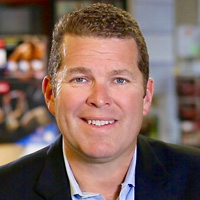“Get comfortable being uncomfortable, Class 181. Tonight is gonna suck!” barked our lead night-shift instructor of Hell Week. Although it was only the second night, it felt like an eternity. At that moment in my life, it was the hardest thing I had ever experienced during a 24-hour period. Nothing was comforting about hearing that tonight was going to be just as challenging as the night before. I tried to reassure myself that he was bluffing and that things couldn't possibly get worse than they already were. Though it would get harder than the night before—in fact, I discovered what hypothermia felt like—I also learned the value of talking to myself.
I sporadically gave myself pep talks when I encountered something I wasn’t sure I could accomplish, such as trying out for the varsity rowing team or getting a passing grade in Electrical Engineering. But up until Hell Week, those self-imposed motivational moments were not routine. Over the five-and-a-half days of Hell Week, I needed to become my own personal motivational coach. I had to convince myself I could endure another minute in the frigid winter waters of San Diego Bay while conducting “midnight laundry” or cheering myself on to do another round of “Log PT” (exercises with a water-logged telephone pole). For every challenge I encountered during Hell Week, I figured out something to fire me up to keep going. Often, I would say something quietly to myself only to find myself repeating it to the rest of my boat crew.
The same instructor who gave us the foreshadowing of our second night of misery also reminded us that no matter how uncomfortable we thought we were in Hell Week, he “promised” that we would be even more uncomfortable in SEAL Team. I thought he was crazy, and again told myself, "He’s “B-S-ing—there’s no way it could be colder and harder than this.” He was right, of course, again and again. Being a SEAL Team member is incredibly uncomfortable, but it turns out there are many difficult things in the civilian world that can match that same feeling. Some of those things I discovered by accident, like avoiding bankruptcy, and others I actively sought out because I then understood the value of being uncomfortable.
For example, I set difficult goals for myself like climbing mountains. Even though it's tough, the feeling of accomplishment I get when I reach the summit is worth it. Every time I have a difficult situation on the trail, either I learn something new about myself or am reminded of an existing quality. Among the lessons I learned were how important focus is, how having perspective can improve your life, and how nature's beauty has a calming effect. Additionally, I observed that silence can be valuable as well. There are many ways to view climbing mountains as a metaphor for life. For example, we all face challenges and obstacles; but it's not the challenge or obstacle itself that matters, rather it is how we deal with them. When we face hardships, do we give up or push through? Does adversity shape who we are, or do we learn and grow from it? Instead of fixating on the long journey ahead, do we focus on taking the next step?
Life is full of hardships, but I believe that we all have the strength to get through anything if we're willing to face the challenge head-on. That's when we discover our true resilience. We just need to be willing to get outside our comfort zone and grow. That's the same lesson I learned during my Navy SEAL training, and it has been a major contributor to my success in life. It may be uncomfortable, but discomfort is often the path to growth. So don't be afraid to take risks and push yourself out of your comfort zone—you never know what you're capable of until you try. Contrary to popular belief, being comfortable all the time is not a good idea.
Why Being Comfortable All the Time is Not a Good Idea
"Anyone with any degree of mental toughness ought to be able to exist without the things they like most for a few months at least," said the American artist, Georgia O'Keeffe. And I think she's right. We should be able to go without our comforts for a little while and still be okay. Being uncomfortable is how we grow. It's how we learn and stretch ourselves. And, it's how we condition ourselves to be able to deal with future difficulties. When we're in our comfort zone, we're not challenging ourselves. We're not learning anything new. We're not growing as individuals. And, we're not preparing ourselves for the future.
There will always be moments of discomfort, no matter how much we try to avoid them. And that's a good thing! Discomfort is a sign that we're alive and growing. It's a tool of discipline and a clarifying force. When you take away what is not essential, the important things stand out. It is only when we are stripped of our usual comforts—all the things we use to protect ourselves from the difficult aspects of life—that we can truly get to know ourselves and discover what is most important to us.
Viktor Frankl, the Austrian psychiatrist and Holocaust survivor, put it well when he said, "What is to give light must endure burning." If we want to grow and develop as individuals, we need to be willing to face some discomfort. We need to be willing to put ourselves out there, even if it means getting burned. For you to shine and get what you want in life, you must first work hard for it and endure all the stress, turbulence, and difficulties that come your way. To radiate wisdom and love, we must first suffer a bit.
How to Practice Being Uncomfortable
If we want to build muscle, what do we do? We give our muscles resistance. The very act of making our muscles “struggle” forces our muscle fibers to get stronger. If we want our car or bicycle to move forward, then our tires need friction. Friction and discomfort provide opportunities for growth in all areas of life, including our personal lives. There are lots of ways to allow yourself to feel uncomfortable, and it largely depends on your perspective. For the average person, climbing Denali would be extremely uncomfortable; however, for someone like a Denali Park Ranger, who typically lives near the summit, it might just be another day at the "office." Uncomfortable is found at the edge of confidence—it's when you question whether or not you can do something. For me, this is where I have to decide what makes me uncomfortable and push myself.
The following section suggests some activities that will help you get outside your comfort zone:
Mental Challenges:
When I was in high school, I had an English teacher tell me that I was a terrible writer and should “spare English teachers the pain of grading my papers and learn math instead.” For a long time, I dismissed the idea of writing a book, and I am certain that my reluctance stemmed from that English teacher's limiting words. Now, I'm writing my third book and have published hundreds of articles, courses, and other written works. Learning how to overcome that first experience of emotional discomfort pushed me to explore writing and ultimately become a published author. Some mental activities that can pull you out of your comfort zone include:
- Learn a new language, skill, or hobby
- Write a book or an article on something you're passionate about
- Read books outside of your comfort zone
- Take that art, poetry, or science class you've always wanted!
- Solve puzzles or riddles you have never seen before
- Surround yourself with people half or three times younger than you
Physical Activities:
Find a physical activity that pushes you beyond your preconceived envelope of capabilities. I guarantee you that you can do more than your brain is telling you. I PROMISE. The challenge is getting to that point where your brain or body says "stop" but your spirit says “I can do it.” When you cross that imaginary “I’m not sure” chasm, you will look at your capabilities and the world differently. Some physical activities you can try include:
- Sign-up for a fitness class or sport
- Try a new outdoor activity
- Set a physical challenge for yourself
- Go on an adventure
- Take a road trip to somewhere new
Social Encounters:
For many, failing and facing potential public humiliation is wildly uncomfortable. It can be so uncomfortable that folks will seek excuses not to even try. What are you afraid of failing at? Go ahead, write them down then pick one and try it. And, when I say “try,” I mean go all-in—give it everything you've got and more than you thought you had. The very act of going all-in is uncomfortable and exhilarating at the same time—like jumping out of a perfectly good airplane!
- Join a club or society you wouldn't usually join
- Make new friends and keep in touch with them
- Participate in a social event outside of your usual circle
- Take up public speaking and present your ideas in front of strangers
- Meet up with people you wouldn't usually meet up with
Emotional Experiences:
We are judgment-making machines, and if we're not careful, we will spend our time proving to ourselves that our judgments are correct. The problem is that we are making one-sided observations. Worse still, as we age, we become more set in our judgments. Here’s where things can get wildly uncomfortable for us: sharing those judgments. When we share our judgments (i.e., being brutally candid, transparent, authentic) we open ourselves up for a new shared experience. When this happens, we grow personally AND we have the opportunity to grow new relationships.
- Spend time alone and get to know yourself better
- Start a journal and document your feelings
- Reach out for help from a friend or a counselor
- Talk to someone about something you would normally keep to yourself
- Consider new perspectives and learn from others
Be Comfortable Being Uncomfortable
So, there you have it, my four major categories of 'uncomfortableness': mental challenges, physical activities, social encounters, and emotional experiences. I hope this inspires you to break out of your comfort zone and explore the unknown, just like I have to with inspiring new and diverse audiences. And, if you ever need some motivation, just remember why you chose to be uncomfortable in the first place. It's about growth, learning, and unlocking your potential. Stepping out of your comfort zone can show you a world of possibilities and experiences that you never knew existed. Oh, one more thing, when you think you’re stuck, give yourself a pep-talk. You will discover you can be quite motivating when you have to be!

